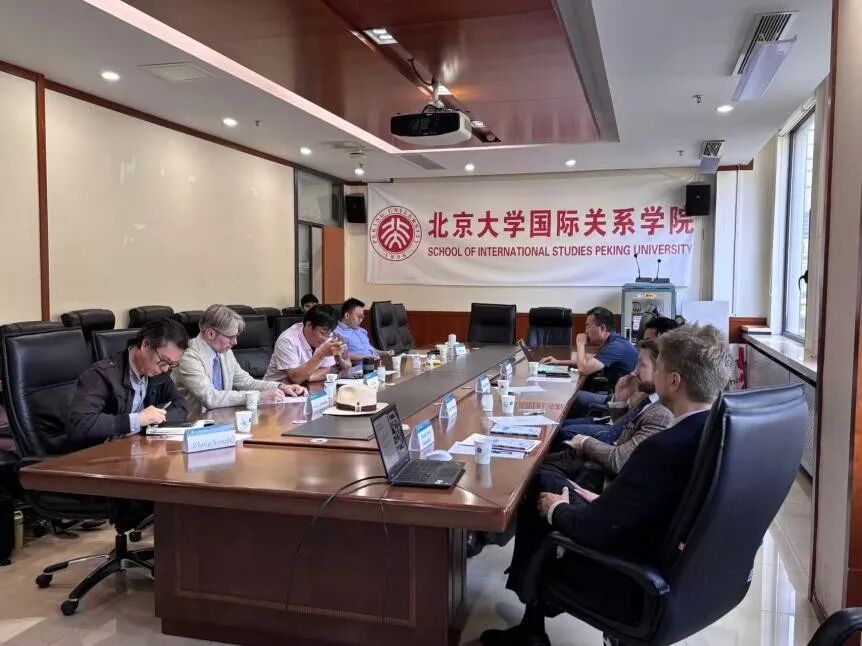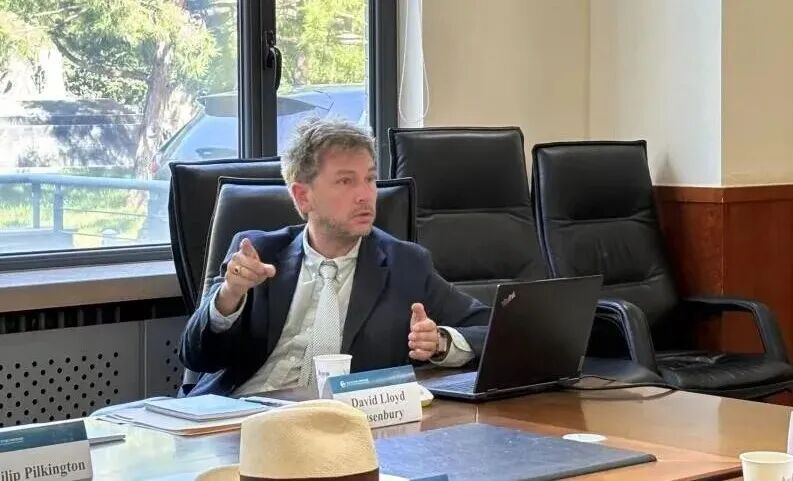
The 60th session of the “Adventus Amicorum” seminar series, organized by the Institute of Area Studies at Peking University (PKUIAS), was held on September 18, 2025. The theme of the seminar was “The Revival of Civilization and New Opportunities for Sino-Western Civilizational Dialogue.” David Lloyd Dusenbury, an associate professor of Humanities at the Hamilton Center for Classical and Civic Education, University of Florida, and Philip Pilkington, a senior research fellow at the Hungarian Institute of International Affairs, delivered the keynote lectures. The seminar was moderated by Zhang Yongle, an associate professor at PKU Law School and a deputy director of PKUIAS. Panel discussants included Eric C. Hendriks, a Dutch sociologist and visiting fellow at the Danube Institute in Hungary; Zan Tao, a professor of History and a deputy director of PKUIAS; Duan Demin, an associate professor at the School of Government and a deputy director of the Institute for the Humanities and Social Sciences, PKU; Kong Yuan, an associate research fellow at the Institute of European Studies, Chinese Academy of Social Sciences (CASS); Jian Lian, an advisor at the Shanghai Chunqiu Institute for Development Strategy; and Shi Qing, a postdoctoral fellow at PKUIAS.
In his lecture, titled “History Begins in China: Hegel, Kojève, and the 21st Century,” Prof. Dusenbury explored how Hegel’s philosophy can serve as an intellectual resource for renewing dialogue between Western traditions and Confucian thought. He began by analyzing the widespread misinterpretations of Alexandre Kojève’s “end of history” thesis and its ironic implications. In 1958, Kojève suggested that the “end of history in a Hegelian–Marxist sense” had been realized through the American way of life, where ordinary people became “satisfied animals” through consumption, and the rest of the world aspired to follow suit. Dusenbury argued that these recurring misunderstandings underscored the need for a deeper engagement with Hegel to confront contemporary challenges.

Prof. Dusenbury then systematically reviewed Hegel’s writings on China, noting that Hegel divided the world into two parts: the “absolutely new” continent of the Americas, with the United States as the “country of the future,” and China as the “commencement of history,” a civilization that was both the oldest and, paradoxically, the most novel. Hegel highlighted three distinctive features of ancient Chinese dynasties: first, “remarkable equality,” where all were equal before the emperor; second, China’s “singular national unity”; and third, the superior governance achieved through the civil service examinations, which he likened to “Solomonic wisdom.” Hegel even asserted that such Solomonic governance was impossible in Europe but realizable in China.
Prof. Dusenbury further recalled Karl Marx’s semi-predictive remarks in the 1850s about the possibility of a socialist revolution in China, arguing that “the relationship between Chinese socialism and European socialism mirrored that between Chinese philosophy and Hegelian philosophy.” He stressed that such insights might help Western audiences to anticipate the “Sinicization” of Marxism in the 21st century. While Hegel once observed that “for the Chinese, China is the entire world,” a statement that may have been accurate in the 19th century but is outdated today, Dusenbury emphasized that contemporary China is a genuinely world-historical state—both the oldest continuous civilization and the possessor of the most modern political systems.
Prof. Dusenbury concluded that in a 21st century filled with both promise and peril, Hegel and Marx identified aspects of China that Kojève and later liberal interpreters in the West largely overlooked. Civilizational dialogue is crucial for the West and also essential for its future development. After recurring misreadings of the “end of history,” we may now look toward an era of revival and renewal of civilizations, guided not by Kojève but by earlier figures such as Leibniz and Matteo Ricci.

Pilkington’s lecture, titled “Marx, Hegel, and the Reappearance of Natural Law in the Post-Liberal Era,” likewise focused on how Hegelian philosophy and the tradition of natural law might contribute to dialogue between Chinese and Western civilizations. He began with Marx’s early critique of Hegel’s Philosophy of Right, pointing out that this work, published even before the well-known Economic and Philosophical Manuscripts of 1844, marked Marx’s first political intervention. While Marx aimed to criticize Hegel’s idealism, his ultimate objective remained Hegelian in nature—he saw himself as advancing Hegel’s project one step further.
Pilkington highlighted the centrality of natural law in Hegel’s thought, noting that although Hegel’s Elements of the Philosophy of Right was published in 1820, its intellectual roots lay in his 1802 essay On the Scientific Ways of Treating Natural Law. He explained how Hegel synthesized Enlightenment and Romantic liberalism through three dialectical aspects: the “dialectic of recognition” (materialist), rooted in biological or physical motivations and later developed by Marx in his theory of class struggle; the “dialectic of law” (Kantian), seeking to establish abstract moral principles akin to modern deontology; and the “dialectic of love” (Romantic), grounded in a Christian, rather than Old Testament, conception of law and freedom.
Pilkington then compared Hegel’s and Ricci’s interpretations of Confucianism. Unlike Leibniz, Hegel rejected the notion that the Chinese concept of “Heaven” resembled the Christian God, or that Chinese ethical traditions shared similarities with Christian ethics. He was critical of the emperor’s position, an attitude possibly shaped by his reliance on Catholic sources, which transplanted Western religious debates into China. In contrast, Matteo Ricci viewed China of Ming Dynasty as the society closest to Plato’s Republic. Ricci criticized the decline in ethical coherence, attributing it to a reduced engagement with classical Confucian traditions. He also dismissed Daoism and Buddhism as unsuitable for moral cultivation and governance, yet he still regarded Confucianism as a highly developed ethical and religious system. Crucially, Ricci argued that Confucianism was, at its core, grounded in natural law.
Pilkington elaborated on natural law as a metaphysical concept, positing that humanity has right and wrong ways of life: following natural law leads to flourishing and happiness, while rejecting it results in suffering and disorder. This teleological framework holds that all societies contain elements of natural law within their ethical structures, though in varying degrees, and that without some adherence to natural law, no society can endure.
Pilkington concluded that as post-liberal Western thinkers increasingly rediscover the necessity of natural law and call for a return to Western natural law traditions, China—having undergone rapid modernization without ever embracing unrestrained liberalism—appears well-positioned to reintegrate its Confucian natural law heritage. Revisiting Hegel’s natural law and Ricci’s interpretation of Confucianism may open multiple pathways for deepening civilizational dialogue.
During the panel discussion, the participating scholars engaged in in-depth exchanges on the urgency and complexity of dialogue between Chinese and Western civilizations. They reflected on Hegel’s views of China, underscoring the need to situate a thinker’s ideas within his historical context, and considered how 19th-century theories might be reinterpreted in today’s pluralistic societies. The discussants emphasized the internal diversity of Chinese traditions, with a particular focus on the interaction between different intellectual lineages. They also examined contrasts and connections between Chinese and Western civilizations, and drew on economic theory and the ancient Chinese concept of “Tianxia” (all-under-heaven). Both keynote speakers responded to the comments and questions raised.


